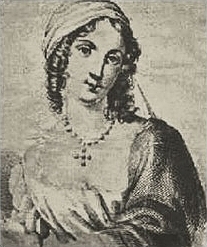Isabella Morra
| Isabella di Morra | |
|---|---|

Alleged portrait of Isabella di Morra
|
|
| Born | ca. 1520 Favale, Kingdom of Naples |
| Died | 1545/1546 Favale, Kingdom of Naples |
| Occupation | Poet |
| Subject | Sorrow, loneliness |
| Literary movement | Petrarchism |
Isabella di Morra (ca. 1520–1545/1546) was an Italian poet of the Renaissance. An unknown figure in her lifetime, she was forced by her brothers to live in segregation, which estranged her from courts and literary salons. While living in solitude in her castle, she produced a small body of work, which never circulated in the literary milieu of the time. Her short and melancholic life ended when her brothers murdered her for a suspected affair.
Only thirteen poems by her have survived to this day. Despite the small corpus she left, her work is considered to be among of the most powerful and original poetic expressions of Italian literature from the XVI century. The style and the topics she dealt with make her a forerunner of Romantic poetry and her lyrics are often subject for feminist criticism.
Isabella di Morra was born into a noble family in Favale (now Valsinni, in the province of Matera), at the time part of the Kingdom of Naples. She was the daughter of Giovanni Michele di Morra, baron of Favale, and Luisa Brancaccio, noblewoman belonging to a Neapolitan family. Her birthdate is uncertain: generally, reference is made to the study by Benedetto Croce which puts it around 1520, although she could be born earlier, about 1515 and 1516.
As a child, Isabella was educated in literature and poetry by her father. She, her mother and her siblings (five brothers: Marcantonio, Scipione, Decio, Cesare, Fabio, and one sister: Porzia) were abandoned by Giovanni Michele in 1528, when he was forced to seek refuge in France after having supported the invading French army against the Spanish monarch Charles V for the conquest of the Kingdom of Naples. He could have returned to Favale as his crime against the Spanish crown was pardoned but he remained in France serving in the army and as a councilor of Francis I as well as attending court festivities. The youngest child, Camillo, was born after he left.
...
Wikipedia
